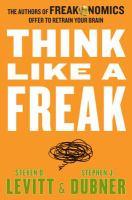
Don’t be turned off by the title; Think Like a Freak by Steven D. Levitt and Stephen J. Dubner is a stimulating book that aims to entertain while educating and expanding the way one thinks. From the authors of Freakonomics and SuperFreakonomics comes the third in the series of what I like to call “interesting non-fiction” that is easily accessible and understandable by the average reader.
The crux of this book is an economic look at various cases where people approached their situation differently than conventional wisdom would prescribe. The stories and studies range from how the world hotdog eating champion more than doubled the previous world record in just one year, to how one well-known shoe company offers its new hires money to quit in order to weed out undedicated employees. The authors examine why Nigerian email scammers overtly make it obvious they’re Nigerian, even when this country is widely known for scams of this type, and how one charity maximized its profits by not contacting potential donors. The main theme that laces these seemingly random cases together is the unique way the people in them each think. By embracing a few basic principles—be humble, consider incentives, admit when you don’t know, embrace that being right is typically not enough, and accept when to quit—you too can solve your own problems and “think like a freak.”
Even if this doesn’t seem like a book for you, give at least one chapter a shot. This book, as well as the other freakonomics books, can be devoured all at once or chapter by chapter, case by case. Even if it doesn’t alter the way you analyze a situation, it will at least give you a fun topic to bring up at a social gathering. The Corinth Library discussed this book in August at book club and it went over really well. Multiple people admitted that they were less than excited when they saw this book on the list, but after reading it, several have now picked up the other Levitt and Dubner books.
If you enjoy this book, you might also like authors Malcolm Gladwell (Outliers, Blink, The Tipping Point), Mary Roach (Stiff, Bonk, Gulp) and Bill Bryson (A Walk in the Woods, I’m a Stranger Here Myself, At Home), all of whom also write “interesting non-fiction” which dissect a given topic in a storytelling style that makes them both entertaining and easy to digest and retain.
